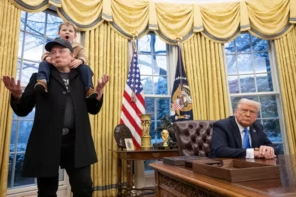Since the 1920s, the Professional Golfers’ Association Tour of America (PGA Tour) has dominated men’s professional, organized golf. With its roots based in tThe United States, the PGA Tour is the pinnacle of golf – turn on the TV or search up golf on the internet, and you’ll likely see a PGA Tour tournament’s results or player-related news articles. It has some of the most powerful purses in golf tournaments from sponsors that are a part of our everyday lives, the most competitive fields creating fierce competition every Thursday to Friday, but to some extent, an underlying monopoly in the entirety of the sport.
In 2021, the Saudi Arabian government released the LIV Golf League, a tour created in opposition to the PGA Tour. Denoted as “LIV” for the 54 holes, instead of 72 holes played per tournament in the PGA, LIV emerged as a newer, less conservative tour. Among this change, LIV allows its players to wear shorts on the course, a team format for competitive play, loud music while play is in session, and fewer tournaments per season with no cuts (and therefore, a guaranteed spot for prize money every tournament); four components the PGA has staunchly opposed since its founding.
Importantly, its source for money is Saudi Arabia’s sovereign wealth fund, formally known as the Public Investment Fund (PIF), governed by Yasir Al-Ramuyyan, the chairman of Saudi Aramco. Worth over $700 billion USD, the deep-pocketed sovereign wealth fund is the 7th largest in the world, and invests in a variety of assets on behalf of the Kingdom of Saudi Arabia. The fund is heavily intertwined with Saudi Aramco and The Saudi Central Bank, who dominate the global oil trade and movement of wealth in the Kingdom.
The University of Michigan’s Journal of Economics, and the Ogden Professor of Economics at the University of Chicago, Dr. Steven Levitt, believe the business model of LIV is fundamentally flawed. The players’ salaries from solely PGA Tour events currently sit around yearly earnings of $1.5 million USD, and LIV members, a whopping $5. 8 million USD. However, the PGA Tour members’ sponsors add another level of revenue stream, that LIV players aren’t subject to. Nevertheless, the response by the PGA Tour indicates a level of fear that LIV will succeed by attracting money with this influx of cash.
Indeed, this capital has attracted many golfers from the PGA Tour, which is understandable when the world’s largest companies and countries are offering life-changing dollars. While the amounts were never confirmed by LIV, some of Tour’s players were offered contracts in hundreds of millions of dollars–from Tiger Woods’ $700-800 million, Phil Mickelson’s $200-300 million, to Dustin Johnson’s $175 million USD contracts (with Tiger Woods the only one not signing), it gave players a chance to greater wealth, lighter schedules, and freedom from the ‘conservative’ rules of the PGA Tour. This ‘bribery,’ combined with Saudi Arabia’s tarnished reputation, particularly from the murdering of journalist Jamal Khashoggi, have led to many accusing Saudi Arabia of ‘sportswashing’ to recover its damaged reputation by merely using the sport for its own benefit.
As a result, some PGA Tour members, such as the 2022 Winner of the FedEx St. Jude Champion Will Zalatoris, has argued “the moral-ethical side [of it], is obviously very tricky, and that’s why a lot of [PGA Tour Members]…just don’t want any part of [LIV].” The PGA is portraying itself as the ethically correct side, arguing the repercussions of signing and committing to the autocratic regime of Saudi Arabia through LIV. Older golfers, such as Tiger Woods and Jack Nicklaus, believed in preserving their legacy with the PGA Tour, pointing to the importance of tradition and nobility deeply rooted in the PGA. To retain talent fiscally, the Tour has added greater purses and prizes. As a result, the PGA’s Commissioner, Jay Monahan, in addition with his policy board, quickly responded with the emergence of 12 Elevated Events, making average purses of $20 million USD for the top-ranked PGA members, and the Player Impact Program (PIP), which gives out $40 million USD to ten golfers that have most positive impact on fans.
Ever since the battle started, the two have also seen each other in courts, with both lacking cooperation and transparency. With a myriad of contract breach issues and antitrust lawsuits against one another, and the slander thrown back and forth particularly in the early days of LIV’s emergence, the matter was a pressing issue for both parties, the players, and the fans of both organizations.
It created a polarised golf community, with a newfound bidding war between the two tours.
However, on June 6, 2023, the PGA Tour and LIV Golf League decided to merge, with no warnings given to players or fans; representing a sporadic decision without much context. The exact framework and model of the two conjoined is yet to be determined (yes, despite the fact that it is now 2024), but two things are clear: many players and& fans have been blindsided by this decision, and golf is now in the hands of money. Even Tiger Woods, 1 of 5 on the PGA Tour’s Player Policy Board, has publicly stated his frustration and level of surprise in the decision.
In 2024, the evolution of gold is being driven by the politics and financial influence of a foreign authoritarian regime. Money has transformed the sport in a way that will impact the current generations and future golfers as well. As a fan and advocate for the PGA Tour, it is hard to side with LIV Golf and what they have done with professional golf. However, it is difficult to argue if there’s any trust, morality, or ethics in the Tour as well. While it will be interesting to see what occurs in the next few months (perhaps even in years at this point), a level of fear will be in all of us, and we need to demand greater transparency.
“Crises are part of life. Everybody has to face them, and it doesn’t make any difference what the crisis is.” – Jack Nicklaus, The Golden Bear








